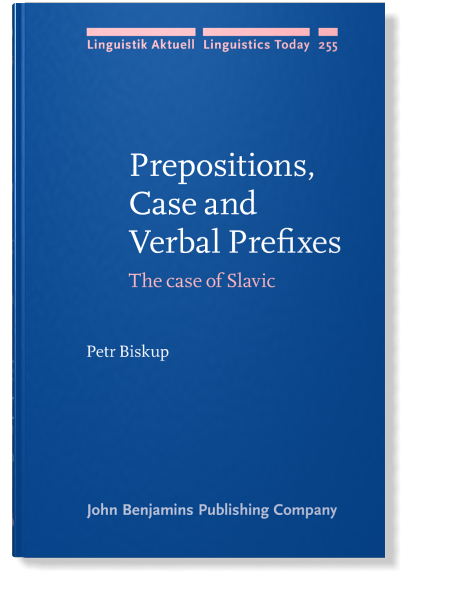Prepositions, case and verbal prefixes: the case of Slavic
This monograph is concerned with prepositional elements in Slavic languages, prepositions, verbal prefixes and functional elements of prepositional nature. It argues that verbal prefixes are incorporated prepositions projecting their argument structure in the complement of the verbal root and that their meaning is based on the two-argument meaning of prepositions, enriched with the CAUSE operator. The book investigates idiomaticity in the realm of prefixed verbs and proposes a novel analysis of non-compositional prefixed verbs based on the operation of predicate transfer. It also offers a uniform analysis of cases. Prepositional as well as non-prepositional cases are treated as a reflection of the agreement operation, whereat the type of prepositional case is determined by semantic properties of the decomposed preposition. Furthermore, it examines prepositions from a diachronic perspective and argues that they can be grammaticalised as future markers under certain circumstances.
zum Buch im ULB-Katalog
zum Buch auf der Verlags-Website
The Polish theatre of the Holocaust
Grzegorz Niziolek’s The Polish Theatre of the Holocaust is a pioneering analysis of the impact and legacy of the Holocaust on Polish theatre and society from 1945 to the present. It reveals the role of theatre as a crucial medium of collective memory – and collective forgetting – of the trauma of the Holocaust carried out by the Nazis on Polish soil. The period gave rise to two of the most radical and influential theatrical ideas during work on productions that addressed the subject of the Holocaust – Grotowski’s Poor Theatre and Kantor’s Theatre of Death – but the author examines a deeper impact in the role that theatre played in the processes of collective disavowal to being a witness to others‘ suffering.
In the first part, the author examines six decades of Polish theatre shaped by the perspective of the Holocaust in which its presence is variously visible or displaced. Particular attention is paid to the various types of distortion and the effect of ‚wrong seeing‘ enacted in the theatre, as well as the traces of affective reception: shock, heightened empathy, indifference. Inpart two, Niziolek examines a range theatrical events, including productions by Leon Schiller, Jerzy Grotowski, Tadeusz Kantor, Andrzej Wajda, Krzysztof Warlikowski and Ondrej Spišák. He considers how these productions confronted the experience of bearing witness and were profoundly shaped by the legacy of the Holocaust.
The Polish Theatre of the Holocaust reveals how – by testifying about society’s experience of the Holocaust – theatre has been the setting for fundamental processes taking place within Polish culture as it confronts suppressed traumatic wartime experiences and a collective identity shaped by the past.
zum Buch im ULB-Katalog
zum Buch auf der Verlags-Website
Weitere Titel können Sie in unseren Neuerwerbungslisten für die Slavistik entdecken!


